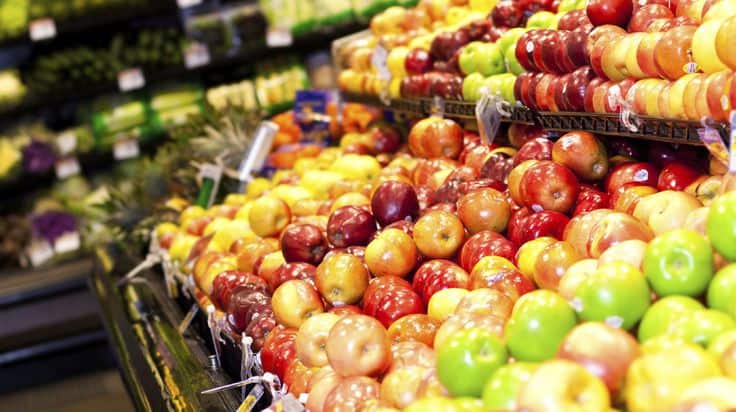We’re in the middle of what can only be described as a movement. People are no longer interested in buying whatever food is the cheapest and easiest to find. We’re getting more health-conscious and more mindful of what we put into our bodies.
A big part of that movement is staying away from pesticides.

Pesticides may help to protect crops from being damaged by pests, but they can have an impact on our bodies in the process. Use these tips to reduce your exposure to pesticides.
1. Look for an Organic Label
The most well-known way to steer clear of pesticides is to buy organic products. Don’t just look for that word, though. Find items with a USDA-certified organic symbol.
For products to be certified organic, the USDA needs to inspect the soil where it’s growing. The inspection needs to show that there have been no pesticides or other “prohibited substances” on the soil for three years before the harvest.
Don’t limit your organic shopping to your produce. Processed food items and personal care items can be certified organic too, so keep an eye out for that label.
2. Shop at Farmers’ Markets
There’s something that feels so satisfying and healthy about buying your produce directly from growers at a farmer’s market. It’s also better for your health because there may be fewer pesticides.
When you buy produce at a farmer’s market, you have the opportunity to ask questions. The people at the booth may be able to tell you whether they use pesticides and how much of it they use.
In fact, some local growers may be using organic practices even if they haven’t gone through the USDA certification process.
As an added bonus, you’re helping your local economy thrive. It’s a win-win.
3. Exercise Your Own Green Thumb
The most direct way to know what is and isn’t in your food is to make the food yourself.
Start a garden at home to grow the fruits and vegetables your family enjoys most. An herb garden is an easy project you can create inside your home as well.
Of course, there are limitations. You may only be able to grow certain types of produce depending on your local climate. You also have space restrictions based on your home and your land.
As you grow your produce, chances are that you’ll battle some pests along the way. Opt for healthy, chemical-free ways to keep them away. Depending on your climate and your produce, this could include introducing certain insects or using specific types of soil.
Above all, be patient. Learning the quirks and needs for each type of plant will take time, but the reward is worth it.
4. Use a Fruit and Vegetable Wash
There are some foods and product types that you won’t be able to find in an organic option, no matter what you do. In these cases, you still have ways to reduce the amount of pesticide you eat.
One way to do this is by using a fruit and vegetable wash. You can buy this at most grocery stores. It’s designed to get rid of any chemical residue on your produce.
While rinsing your produce with water is helpful, it won’t be as effective in blocking chemicals as a specialized produce wash.
5. Peel Your Produce
If you can’t find a fruit and vegetable wash or if you want to be even more sure about avoiding pesticides, you could skip the skin entirely.
Peel the outer layers off every piece of produce you or your family eat. This is one of the most effective ways to avoid pesticides and the health problems they can cause. After all, as this guide explains, pesticides can even harm the mitochondria inside your cells.
It’s true that fruit and vegetable peels are excellent sources of fiber. However, there are plenty of other ways to get more fiber in your diet without risking pesticide exposure.
6. Avoid Certain Fruits and Vegetables
When it comes to pesticide exposure, not all fruits and vegetables are created equal.
Studies have shown that some fruits and vegetables carry more pesticides than others. It may be because these items attract more pests or because they absorb more of the pesticides they’re exposed to.
Regardless, there is a “dirty dozen” list of the fruits and vegetables that tend to carry the highest pesticide levels. The worst include strawberries, spinach, kale, and nectarines.
If you want to minimize your pesticides, it may be wise to avoid these items altogether. Or, you can take special care when you use them by cleaning them more thoroughly or peeling off the skins.
7. Dry Your Produce After Washing It
It sounds like a simple step, but drying your produce after you wash it can make a serious difference.
Washing fruits and vegetables will break loose the pesticide residue that has been clinging to their surfaces. If you let the produce air-dry, though, the residue could still stick around.
Wiping your clean produce with a towel can wipe away more of those pesticide residues. It takes a little time but it can help you reduce the amount of pesticide you eat.
Taking Steps to Reduce Your Exposure to Pesticides
Let’s be honest: the easiest thing to do would be to give your family all the junk foods and processed foods they crave. You’re giving them fruits and vegetables instead because you want them to be healthy, and the same goes for your own health.
It’s frustrating, then, to know that the pesticides in those healthy foods could be putting you at risk.
The tips above can help you to reduce your exposure to pesticides, and they’re all steps you can take right now.
If you’re looking for more ways to boost your health, check out more health articles on our blog.
Also Read- 10 Easy Keto Dieting Hacks to Improve Your Health










